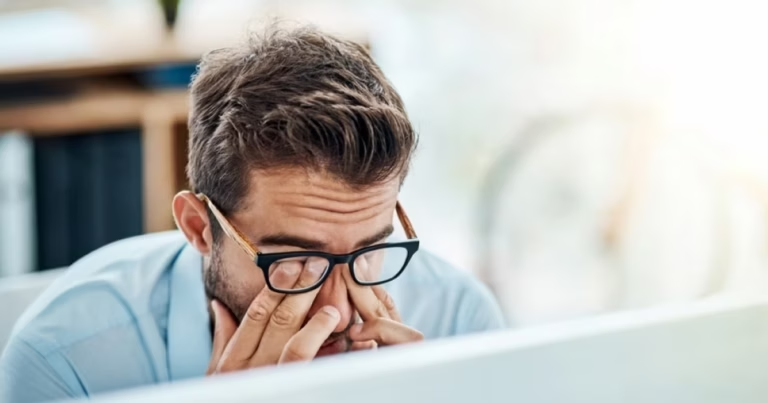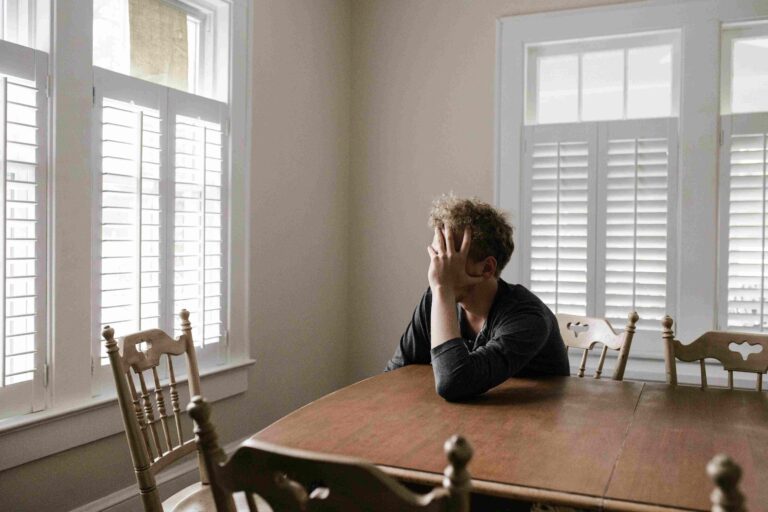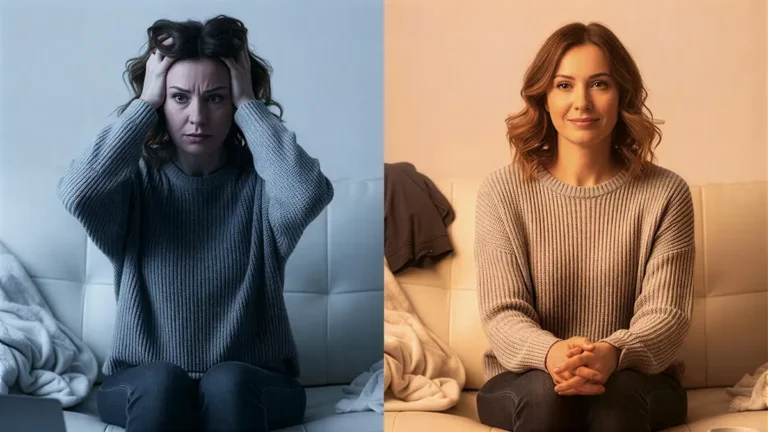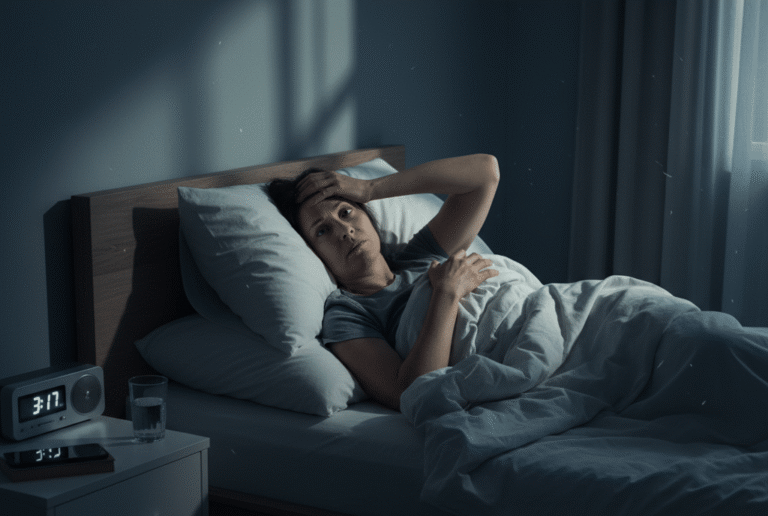Do I Need An Emergency Room or Is It Anxiety? (5 Key Signs)
Written by: Cheryl Brydges, BSW, Licensed Bachelor of Social Work
Updated: February 24, 2026
Key Takeaways: Anxiety vs. Physical Illness
Do I Need An Emergency Room or Is It My Anxiety?
Many often ask how they can tell the difference between physical symptoms caused by anxiety and physical symptoms that need immediate medical attention. No one wants to be the person that goes to the ER for a heart attack and leaves with a diagnosis of anxiety. Not only is it expensive and time-consuming, but it can also be embarrassing and somewhat invalidating. So, how do we know when to get help and when to treat our anxiety ourselves? Below we explore how anxiety can manifest physically, what symptoms to watch for, and practical strategies for managing anxiety that often masquerades as physical illness.
🙉🙉 Audio Learner?
Take a brief deep dive into The Critical Differences between a Heart Attack vs Panic Attack
How Anxiety Creates Real Physical Symptoms
When anxiety turns on your fight-or-flight response, it floods your brain and body with stress hormones like adrenaline and cortisol. This survival technique starts to prepare your body to face immediate danger, but when triggered by stress or worry, it can create a myriad of uncomfortable physical symptoms. Your nervous system is not capable of telling the difference between facing a tiger that is running straight at you and a stressful social situation. Both situations trigger the same response, which explains why anxiety can feel so physically overwhelming.
When Anxiety Attacks Your Heart
Racing Heart and Chest Pain
Anxiety often mimics heart conditions, creating symptoms that feel identical to cardiac emergencies. During an anxiety episode, your heart rate can spike so intensely that sometimes it can reach 100-150 beats per minute. This rapid heartbeat, combined with chest tightness or sharp pains, often has people fearing they are having a heart attack.
The difference between the two? Chest pain from anxiety often feels sharp or stabbing, but cardiac pain feels like crushing or squeezing pressure and may radiate to the arm, jaw, or back. Another difference is that anxiety chest pain also tends to come and go quickly but heart attack pain is often ongoing and worsens as time passes.
Palpitations and Irregular Heartbeat
Heart palpitations, which are when it feels like your heart is skipping beats or pounding, are another common anxiety symptom that feels like a cardiac emergency. This can be terrifying to most, especially when they occur suddenly or during calm moments. In those moments we are often more aware of our fast heart beat and heart pounding. Anxiety palpitations are generally harmless but they feel very similar to some heart rhythm disorders. The key difference is that anxiety-related palpitations usually match up with worry, stress, or panic, while cardiac arrhythmias may occur without any emotional triggers. Emergency physicians follow specific protocols to rule out heart attacks. According to the 2021 AHA/ACC Guidelines for the Evaluation of Chest Pain, certain symptoms like crushing substernal pressure or pain radiating to the left arm are high-risk indicators that require immediate testing.
When Anxiety Steals Your Breath
Shortness of Breath and Hyperventilation
Breathing difficulties are some of the most frightening anxiety symptoms. During anxiety, you might feel like you can’t get enough air, you might experience rapid and shallow breathing, or you might feel like you’re suffocating. These anxiety symptoms mimic asthma attacks or other respiratory conditions so closely that many people begin to worry if they should seek medical attention.
Throat Tightness and Air Hunger
Anxiety can create a sensation of throat constriction, which may make you feel like your throat is closing. This feeling of a lump in your throat can be particularly distressing because it seems like you are not going to be able to keep breathing. Unlike asthma, where breathing difficulties stem from actual airway constriction, anxiety-related breathing problems are functional. Your airways will remain open, but your breathing pattern becomes disrupted due to muscle tension and hyperventilation.
The Gut-Brain Connection
Nausea and Digestive Upset
Your digestive system contains more nerve cells than your spinal cord, so it is no surprise it has earned the nickname “second brain.” This neural network explains why anxiety so often affects your stomach and intestines. Anxiety-induced nausea can be severe enough to cause vomiting, and at times it will mimic food poisoning or stomach flu. The difference is in the timing and triggers, anxiety nausea typically occurs during stressful situations and improves when anxiety subsides while food poisoning or the stomach flu will continue past stressful situations.
Irritable Bowel Syndrome (IBS) Symptoms
Chronic anxiety can create persistent digestive issues that mirror IBS, including:
- Abdominal cramping and pain
- Alternating constipation and diarrhea
- Bloating and gas
- Urgent need for bathroom breaks
Stress hormones can alter gut bacteria, slow digestion, and increase intestinal sensitivity. This creates a perfect storm for digestive distress. Many people with anxiety disorders can develop secondary digestive issues that persist even between anxiety episodes.
When Tension Takes Over
Headaches and Migraines
Tension headaches are likely the most common physical manifestation of anxiety. Chronic worry and stress can cause sustained muscle tension in your neck, shoulders, and scalp, which leads to persistent, dull headaches that can last for hours or days. For some, anxiety can also trigger migraines. The stress response that occurs because of anxiety affects blood vessel dilation and neurotransmitter levels. Both of these are factors in migraine development. Anxiety-related migraines will often occur during or after stressful periods or anxiety attacks.
Muscle Tension and Pain
Ongoing anxiety can keep your muscles in a state of partial contraction, just waiting for action that will never come. This chronic tension can create pain throughout your body, but often particularly in your:
- Neck and shoulders
- Back muscles
- Jaw (from teeth clenching)
- Arms and legs
Over time, this muscle tension can lead to trigger points which are localized areas of extreme sensitivity that push pain to other parts of the body. This further complicates the diagnostic picture.
Fibromyalgia-Like Symptoms
Some people with severe and chronic anxiety develop widespread pain that resembles fibromyalgia. This includes tender points throughout the body, fatigue, and sleep disturbances. Stress and anxiety obviously play a large role in pain perception and processing.
Distinguishing Anxiety from Physical Ailments
Determining whether your symptoms stem from anxiety or an underlying medical condition requires careful observation and, often, professional evaluation. It is important to recognize these things to help ensure you are receiving treatment for the proper issue, whether that is anxiety or a physical illness, you deserve to be treated effectively. Here are some key factors to consider:
Timing and Triggers
Anxiety-related symptoms will often occur with stress, worry, or specific triggers. They usually appear suddenly and during stressful situations. They will usually improve when you relax or remove yourself from the stressful environment or situation. Physical illness usually follows different patterns. Heart conditions may worsen with physical exertion, while respiratory issues might be triggered by allergens or weather changes, and digestive problems could be caused by specific foods you eat or your eating patterns altogether.
Response to Relaxation
Anxiety symptoms will often improve with relaxation techniques, deep breathing, or calming activities, and when needed, medication. If your chest pain eases when you practice meditation or your stomach calms during a peaceful walk, anxiety might be the cause of your symptoms. Physical conditions typically don’t respond as much to relaxation alone. While stress management can help with many medical conditions, the primary symptoms usually require specific medical treatments.
Symptom Patterns
Anxiety symptoms tend to come together and may shift from one body system to another. You might experience heart palpitations one day, stomach issues the next, and headaches the week after. All of these symptoms could be related to the same underlying anxiety. Medical conditions, however, usually create more consistent, predictable symptom patterns that follow logic.
Duration and Progression
Anxiety symptoms typically come in waves, building to a peak and then subsiding. Panic attacks typically last only 5-20 minutes, although the lasting effects of the panic attack may stay longer. Medical emergencies usually have different timelines. Heart attacks will usually involve sustained, worsening pain, while asthma attacks may build more gradually over time and may refuse to resolve without specific interventions.
When to Seek Medical Attention
While many physical symptoms come from anxiety, it’s incredibly important to rule out serious medical conditions, especially when you are experiencing:
- Chest pain with radiation to arms, jaw, or back
- Severe shortness of breath that doesn’t improve with rest
- Sudden, severe headache unlike any previous headache
- Persistent abdominal pain with fever or vomiting
- Any symptom that feels different from your usual anxiety patterns
Emergency medical care is necessary for any symptom that could indicate a life-threatening condition. It is better to be cautious than to ignore a potentially serious issue. If you are unsure if your symptoms need medical attention, it is always best to err on the side of caution and seek professional help. Trained medical professionals can assess your symptoms and determine the best course of action based on your report of symptoms and the situation. Sometimes, having someone on the outside look at the situation, can help you see patterns in symptoms that will later help you determine when it is anxiety or a physical illness.
How to Treat Anxiety That Mimics Physical Illness
Managing anxiety that presents as physical symptoms typically requires a combination of strategies to address both the mental and physical aspects of the condition. Here are some effective approaches:
Therapy
Cognitive Behavioral Therapy (CBT) can be very effective in treating anxiety. CBT can help identify and change the thought patterns that contribute to anxiety and ultimately the physical symptoms. Exposure therapy can be useful for individuals with panic disorders. Exposure therapy gradually reduces sensitivity to anxiety triggers, such as social situations.
Medication
Medication may be prescribed to help manage anxiety. Selective serotonin reuptake inhibitors (SSRIs) or other medications can help reduce symptoms, though they are typically used with therapy. Some anxiety medications are used specifically for their effects on the physical symptoms. Always talk with your healthcare provider to determine whether medication is best for you and for your situation.
Relaxation Techniques
Practicing deep breathing, progressive muscle relaxation, and meditation can help to calm the nervous system when fight or flight is activated. This works to reduce some of the physical symptoms of anxiety, like a racing heart or muscle tension. Activities like yoga, tai chi, or mindfulness can also help to regulate your anxiety symptoms over time.
Lifestyle Changes
Often, regular exercise can lower stress levels by increasing the endorphins in the brain. Endorphins are the body’s mood enhancers and occur naturally. Eating healthy, staying hydrated, and limiting caffeine can help you better stabilize your mood and reduce the physical symptoms of anxiety. It is also important to ensure you are getting enough sleep because a lack of sleep will often exacerbate anxiety symptoms.
Stress Management
Identifying and reducing any sources of chronic stress in your life wherever you can is helpful in regulating chronic anxiety. This may include the need to set boundaries at work and home, seek social support, or delegate tasks to others. You can also develop a self-care routine. A great routine will often include taking breaks regularly, hobbies, and activities that bring you joy and happiness.
Grounding Techniques
Grounding exercises can help you stay present, both in time and space, when anxiety feels overwhelming. Often, anxiety is rooted in past or future worries. Techniques like focusing on your surroundings, engaging your senses, or using the 5-4-3-2-1 can pull you out of the cycle of anxious thoughts and into the present moment.
Education
Learning about anxiety and how it manifests physically can help you feel more in control. Understanding what causes these sensations and that they are a part of the body’s stress response can reduce your anxiety around them. Also, knowing that the symptoms you experience are not a sign of an underlying medical issue can also reduce fear and worry.
Consult Professionals
Regular check-ins with your healthcare provider can help you rule out any medical issues. It can also reassure you that your symptoms are in fact anxiety-related. If you deal with anxiety, it can be incredibly important to go to your yearly appointment with your primary care provider so you are better able to see physical illness coming before it is hard to handle or is mimicking your anxiety symptoms. Working with a mental health professional who can create a tailored treatment plan to manage your anxiety and physical symptoms is most effective.
Taking Control
Anxiety that mimics physical illness can feel incredibly overwhelming. But it is incredibly important to remember that these symptoms are manageable. When we understand the connection between mental health and physical symptoms, we can take proactive steps to address both. We now know what anxiety symptoms may look like physical illness so we can better determine if we need mental health treatment or physical health treatment. When you are having anxiety and need mental health treatment, it can be important to combine therapy, relaxation techniques, lifestyle adjustments, and professional guidance to better reduce the impact of anxiety on your body and your mind. With some patience, self-awareness, and consistent care, you can gain control, ease your symptoms, and improve your overall quality of life. Now, we can better determine if the emergency room or a grounding technique is the best answer for physical symptoms that could be anxiety or a physical illness.
Do I Need An Emergency Room or Is It Anxiety Facts and Questions (FAQ)
Why is my anxiety worse at night?
The answer to this question is very personal for each person. Some of the common reasons people may have worsened anxiety at night include: Fewer distractions to distract from worries, increased isolation at night, being more aware of your body due to a lack of sensory input, and difficulty regulating emotions with fatigue.
Are anxiety and depression connected?
Yes, anxiety and depression can be connected. Many will experience both disorders at the same time and they share similar symptoms as well. It can also be noted that living with one chronically can lead to developing the other. Some of the shared symptoms include: restlessness or irritability, trouble sleeping, difficulty in concentrating, and unexplained physical symptoms.
Which anxiety medication is best for me?
This answer is very individualized. Everyone has different factors that lead our psychiatric experts to recommend different anxiety medications. Because medications work differently in every person it is important that you ask your medication provider which medication will work best for you. Here is a types of anxiety medications list so you can be prepared when speaking with your provider:
– Selective Serotonin Reuptake Inhibitors (SSRIs)
– Serotonin-Norepinephrine Reuptake Inhibitors (SNRIs)
– Benzodiazepines
– Buspirone
– Beta-blockers
– Antihistamines
Where does anxiety come from?
Anxiety comes from within us but can be caused by many different things. Genetics and biology are a huge factor and life circumstances and experiences also play a role. Your current stressors, past experiences, personality, and other factors all come together with genetics and biology to lead to anxiety.
Are anxiety medications addictive?
Not all anxiety medications have the risk of addiction but some do. The risk varies based on the medication and any history of substance use should be discussed with your medication provider prior to taking anxiety medication. Benzodiazepines are anxiety medications that have a higher risk of dependance compared to other anxiety medications. If you are worried about possibly being addicted to or becoming addicted to anxiety medication, please discuss this with your medication provider so they are better able to help you.
Who can help me manage my anxiety?
You are the best person to help you with your anxiety but at times we do need more external help. Here is a list of professionals that can help you better manage your anxiety:
– Psychologists
– Psychiatrists
– Psychiatric Nurse Practitioners
– Licensed Clinical Social Workers
– Licensed Counselors
Who prescribes anxiety medications?
– Psychiatrists
– Psychiatric Nurse Practitioners
– Primary Care Physicians (PCPs)
– Internists and Family Doctors with mental health training
** Important Resource: ** If you or someone you know is in distress or immediate danger, help is available.
- 988 Suicide & Crisis Lifeline: Call or text 988 (USA) for free, confidential support 24/7.
- Crisis Text Line: Text HOME to 741741 to connect with a Crisis Counselor.
Medical Disclaimer: The information provided in this article is for educational purposes only and does not establish a doctor-patient relationship. While Dr. Osuntokun is a board-certified psychiatrist, this content is not a substitute for professional medical advice, diagnosis, or treatment. Never disregard professional medical advice or delay in seeking it because of something you have read on this website. If you believe you are experiencing a medical emergency, please call 911 or go to the nearest emergency room immediately.






